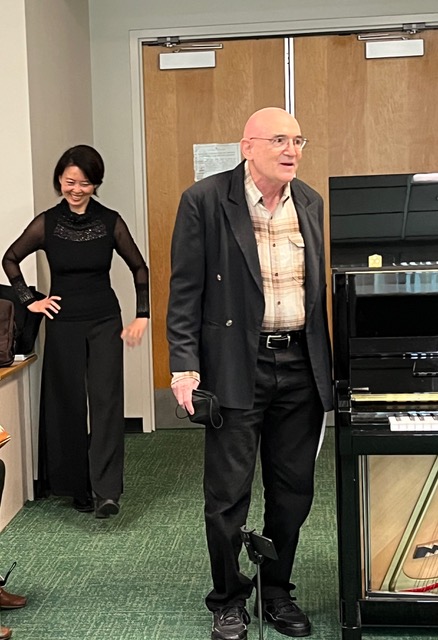SoCal has been experiencing record-breaking heatwaves. The hottest of all neighborhoods in the greater Los Angeles area, Woodland Hills is known as the “heat pocket,” with the Santa Monica mountains blocking the sea breezes. Platt Library, the venue my recital every other month, is in Woodland Hills. When I played my recital from 1-2PM this past Saturday, the temperature outside was reaching 111°F.

Supported by the Friends of the Platt Library, and the adult librarian Marc, their concert series has been building a wonderful community of music lovers. They offer space and time for people to gather to celebrate our love of music, and the importance of local community building. Sometimes, the concerts end up being standing-room only.
(The photo, of Marc introducing me to the audience, is from my concert at Platt in June – I definitely would not have worn long sleeves, or long pants this Saturday!)
Despite our track record with the audience turnout, however, this weekend, with the forecasting showing the high of 117 °F, I was not sure how many people would show up. But it turned out, I had nothing to worry about. As soon as I walked in, 30 minutes before to warm up, there were already people sitting in the front row, right in the center.
Not all the seats were filled as usual. The make up of the audience was slightly different, too. I usually see some families with children, or young couples, but this weekend, more than half of the audience were the regulars. They were the older-adults some of whom I already knew by name. Maybe younger generations who grew up with AC and IT are less engaged, compared to those who grew up with fans and radios.
As I always do, I talked in between the pieces. I talked about Chopin as a homesick, exiled revolutionary fighting for Polish independence. I talked about Gershwin as a son of Russian Jews whose parents came to the States to escape the anti-Semitism. And I played Margaret Bonds’ Troubled Water, a variation on the spiritual Wade in the Water. Some say Harriet Taubman used the song as one of the Songs of the Underground Railroad, to encourage and convey coded information to escaping enslaved people. The audience asked me questions and shared their thoughts and reflections. Despite oppression and difficult circumstances, people have always continued to create and share music. It’s a testament to human resilience. Music gives us a chance to listen to the marginalized voices and stories.
My ultimate goal as a musician is to amplify marginalized voices to enrich our collective harmony. That is why I feel compelled to share here about Taliban’s new set of “morality” laws, published at the end of last month, which includes prohibition on women having their voices heard, or their faces seen. When the Taliban took over Afghanistan, they banned music along with other forms of art, culture and entertainment. In 2023, they burnt musical instruments, speakers and amplifiers and prohibited music in public. Afghan girls continue to be banned from going to school after sixth grade. As a musician and cosmopolitan, I believe that freedom of expression, and freedom from any form of discrimination and oppression are basic human rights, as stated in the Universal Declaration of Human Rights.
Pingback: 美笑日記9.10:111度の演奏会 - "Dr. Pianist" 平田真希子 DMA